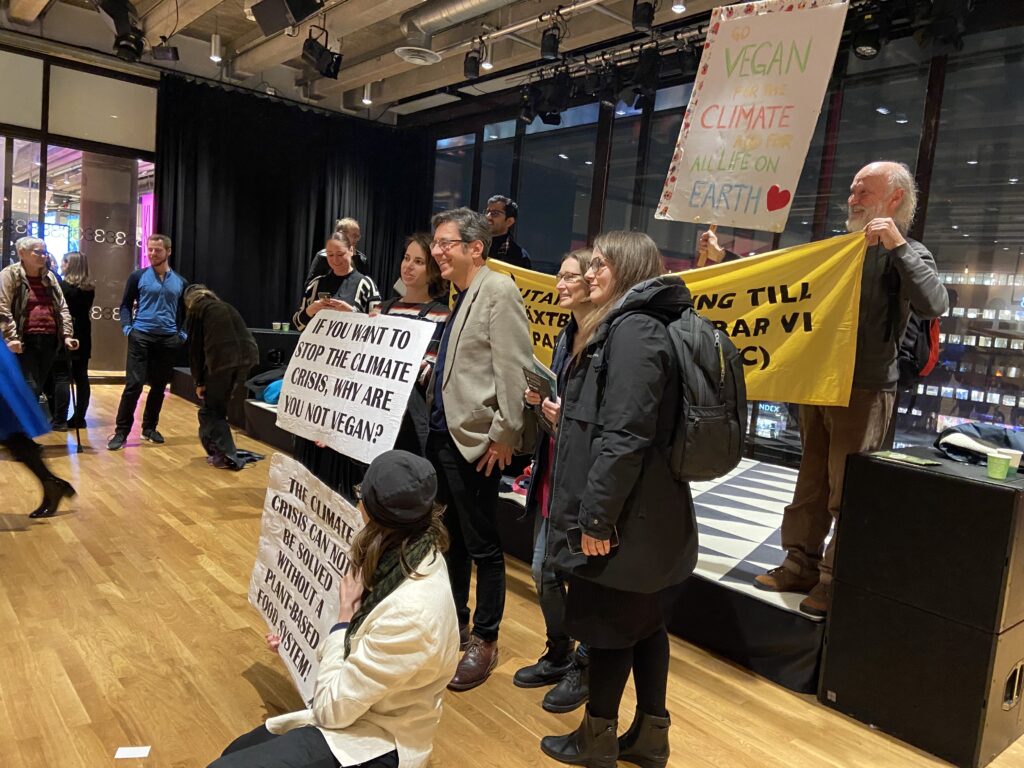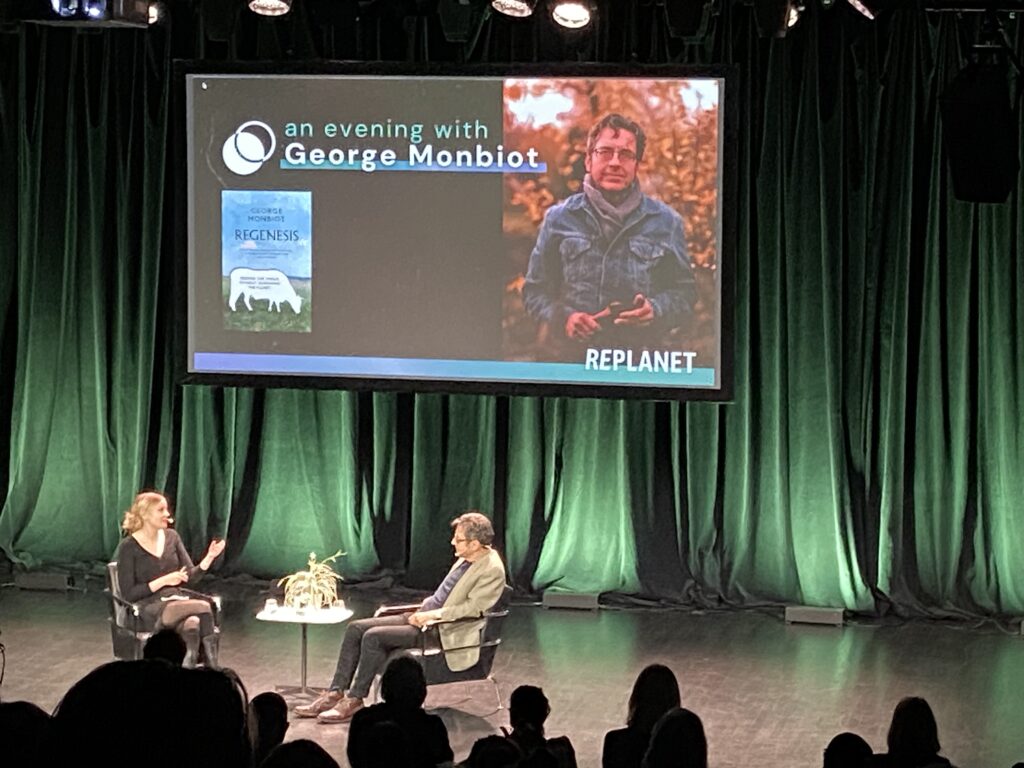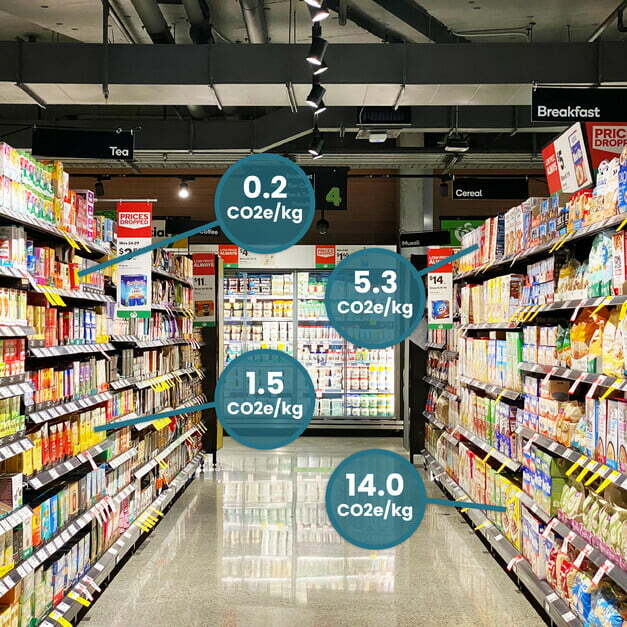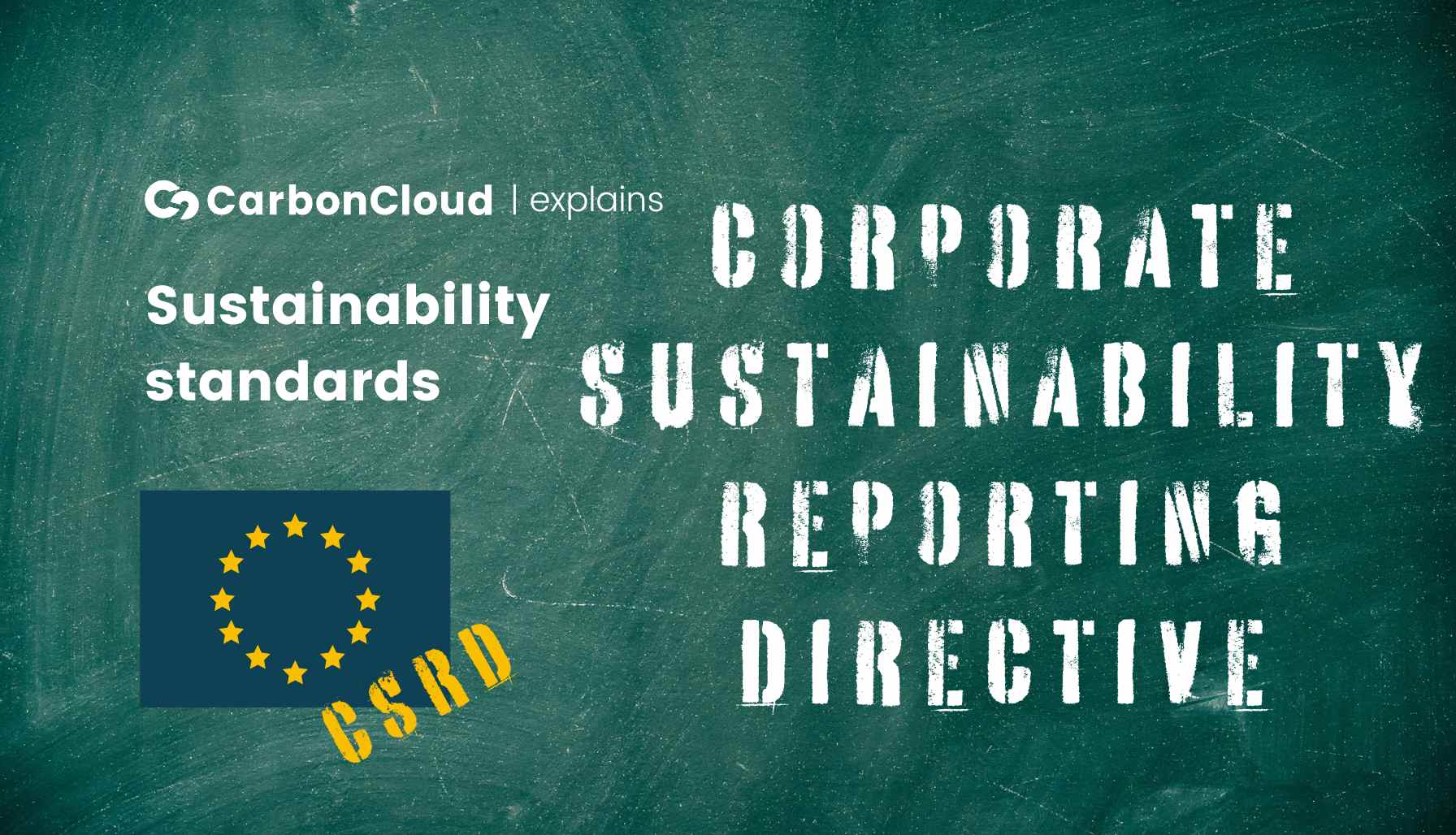A walk in Stockholm with George Monbiot: How do we Reboot Food?
George Monbiot is one of the most influential environmental voices in the world, with a clear, factual message and a dedicated following – us at CarbonCloud included. George has a number of titles that outline his immense footprint in the environmental domain –investigative journalist, author of several books, columnist for the Guardian, narrator of zeitgeist-changing documentary Seaspiracy, acknowledged with UNEP’s Global 500 Award and The Orwell Prize for journalism. However, no description of George Monbiot is as prominent as Activist with the complete meaning of the word. Both his words as well as his own life and actions encapsulate the same message: We all need to act individually and politically, more and substantially, to combat the climate crisis.
Naturally, when we found out that the most prominent author in food and climate change and an influential voice to us at CarbonCloud is visiting Stockholm, we had to talk to him. Straight out of their press launch in COP27, Reboot Food, an awareness campaign on the environmental impact of livestock and land use initiated by the NGO RePlanet, brought George Monbiot to Sweden for a thrilling interview with debater and columnist, Myra Åhbeck Öhrman… and then with us!
After the discussion, an enthusiastic crowd swarmed George at Stockholm City Theater. This was a moment full of hope, a not so accessible feeling when change resistance is on someone’s daily plate. So after that we walked through Stockholm’s city center with George Monbiot with some pressing questions for the food industry.

George coined the phrase Micro-Consumerist B***cks (MCB) to describe market initiatives directed to changing consumer behavior towards environmentally friendlier patterns. The problem? Apart from two major changes, switching to a plant-based diet and eliminating flying, all else in his own words “(…) distracts us from systemic problems and undermines effective action” [1]. On this context, we had to ask:
What is going on in the food industry with all the “neutrality” declarations? How are food producers with an honest motivation to do the right thing caught up in MCB – most likely unknowingly?
My feeling is that food producers need encouragement to be as bold as they can be. Technologies allow it but they need a social license of some sort. They need us citizens to say “we want this, we want you to do this – we are just waiting! You do it, and we will buy and will defend you against other lobbies who try and stop it”.
In the meantime, they will move cautiously. Being out in front is a difficult place to be. There are first mover penalties, you can put all the work in, all the money in, and then someone else comes and moves into your territory and takes over. It's the same with pioneering new farm techniques. Someone will develop it and someone else will profit from it. Obviously, there's a lot of risk aversion in business – less in venture capital, more in the manufacturing sector. But the counterweight is that there's a lot of drive and excitement from the ones who try to come out in front. A lot of money gets thrown around but not always very wisely!
"I have never complained about more data being gathered. But it's what you do with that, data that counts."
From our part, we know of a singular risk remover: Conformity, or as translated in the sustainability domain, a standard. So, is “waiting for The Standard” the right strategy?
You need cultural change, even within the industries that should be leading the change. We are so beaten down because we have internalised so much oppression and we become timid and meek. I realize that. As Emma [Smart, scientist and campaigner at RePlanet] was saying, those of us in a privileged position have to use that privilege to break out of that timidity.
After last year’s COP [COP26 in Glasgow, 2021], and particularly reading Vasily Grossman's 'Life and Faith' –a very powerful, remarkable book– I realised that our Great human flaw is obedience. And obedience is actually stronger than our survival instinct. We will obey someone who wants to kill us and they are going to kill us all if we don't pull out of this death spiral that they created! We will obey until the water rises above our heads. The first fight is with ourselves; always the first fight is against our own obedience.

But pressure actually do anything for the change we need? With Climate Related-Financial Disclosures being mandated in the largest economies, starting with George’s native UK in 2023, can we have any faith that the process will powercharge the change we need? Especially considering that while the reporting is mandated, the sanctions for foregoing disclosures are yet to be announced.
Monetary enforcements are always the crucial element which is so often missing. You can have the best laws in the book if there's no one to enforce them, they count for nothing. I've never complained about more data being gathered; I will never complain about knowing more about any subject at all. But it's what you do with that data that counts. And reporting emissions and acting upon those reports is another thing altogether. First, we have to add to be penalties for non-compliance but secondly, we have to ensure that knowledge translates into action.
The problem is worldwide: We are seeing governments accumulating knowledge and talking about it. But it's almost as if it's a substitute for action. It's almost as if it's a way of saying 'We've got the data with, we've got these eminent reports, but taking action? What kind of government do you think we are?!'
Monbiot’s high spirit and lively delivery of even the most crucial messages was there throughout the whole interview. This urged us to double-check this one because both CarbonCloud and our customers have gotten much hope from the mandate of emissions data reporting. So, no faith at all?!
I wouldn’t go that far! Data is a tool: It can’t solve the problem by itself, but we can’t solve the problem without data. It’s not a sufficient answer but it’s a necessary part of the answer.
There are gaps in the data –there always are– and this is a problem in the UK right now: Deleting data from government websites. If I look for reports that are more than a couple years old, they are deleted by the government. These crucial sources of data and a lot of current reports are not even released into the public domain anymore.
"These tools become powerful as we as citizens make use of them. Change never comes from the centre. Society is like an amoeba. It moves from the margins, not from the centre."

So how can we do this for the food system? How did the automotive industry change and what can the food industry learn from it? Spoiler alert: Like an amoeba!
There’s been a lot of campaigning around the automobile industry – some very good campaigning. Even in the automobile industry, change has been far too slow but at least there is something happening. It has been driven by a coalition of interests campaigning against local pollution, and people campaigning against climate breakdown, against road building, but food brings together even more interests.
In addition, the older the industry, the more we defend it and believe it's part of us, part of our culture, and we don't like to criticise traditional industries. We are very new-phobic! We despise the new and we defend the old and it should be the other way around.
Walking through Stockholm and listening to George Monbiot’s analysis, the instant hand-to-heart thoughts were leaders in food production as well as the changing food systems. Mycorena’s pioneering fermentation technology and Stockeld Dreamery’s plant-based cheese alternative from fermentation. Annika Hansson’s words from Oatly: “How can we impact consumers to drive the change? When we started, we did not know how to do it; we just needed to do it”.
Food is changing – but not passively. Citizens, innovation, the system itself are driving it. What can the food industry do? Joel Scott-Halkes from RePlanet chimes in:
In the meantime as this crucial transition is taking place, all foods should have clear sustainability labelling that shows at least two crucial metrics: carbon emissions and land use, the latter being the best simple metric we have for assessing a food's impact on biodiversity and ecosystems.
Put simply, the more land that food production uses the more harm it causes to nature, the less land it uses the more it helps us make space for nature restoration. The food industry urgently needs to help consumers become literate on land use and its massive impacts on the health of our planet.
What does George Monbiot think? These were his last words to us.
"I am all for innovation, I am all for new powerful technologies. We have to keep pushing."
See the full lecture from Reboot Food below or check out George Monbiot’s latest book Regenesis: Feeding the world without devouring the planet and his column on The Guardian.
Newsletter to-go?
Our special today is our Newsletter, including snackable tips, hearty climate knowledge, and digestible industry news delivered to your inbox
Related Posts
PlanetDairy makes great-tasting hybrid cheese with a 40% reduced climate footprint
“But cheese though”, many sigh in despair. PlanetDairy is here to remove the but and the despair, granting us Audu, a cheese experience minus 40% of the emissions. Amen. Already in more than 1
Climate footprint labels: Why we use the number – and why the entire food industry will too.
The quantitative and specific climate footprint label may still be perceived as disruptive but we are certain that there simply isn’t a way that is more informative and transparent to communicate th
Planet A Foods sells 92% CO2e savings – and the food industry is buying
One could say that Planet A Food’s main product is CO2 savings. One could say that, if Planet A Food’s flagship product, Nocoa, wasn’t taking over the confectionery world. Planet A Food’s oat
ESG Standards Explained: Corporate Sustainability Reporting Directive (CSRD)
The European Union’s Corporate Sustainability Reporting Directive (CSRD) is mobilizing ESG reporting for the food and beverage market. But there is another good reason to look at CSRD closely: CSRD







